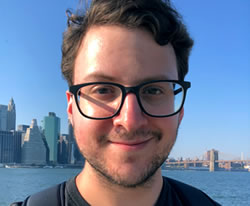
Interview with 2018 CineStory Second Place Winner Avishai Weinberger
Recently, CineStory's Co-Executive Director Carlo Martinelli caught up with the 2018 CineStory Fellowship second place winner, Avishai Weinberger. Avishai is firmly rooted in the CineStory community: Not only was he last year’s Feature Fellowship second place winner, he also was a semifinalist in the 2018 Feature Fellowship competition and has attended the Feature retreat twice.
In his conversation with Carlo, Avishai reflected on what he took from his experience at the CineStory retreats how that experience has impacted his developing career.

Q: Tell us a little about yourself.
A: I’m a writer director living in New York. I graduated NYU’s undergrad film program two years ago and focus mainly on writing horror features. While I’m not doing that, I’m preparing for Shabbos and leading Saturday morning services at my synagogue.
Q: Tell us when you attended a CineStory retreat.
A: In early 2017, I flew out to LA for a general meeting. I was looking for things to do on the side, and my mom recommended I meet Lisanne [CineStory’s Board President]. (They’d gone to school together.) So I reached out to Lisanne, we grabbed coffee, we immediately hit it off, and she suggested I submit my latest script to the CineStory Feature Fellowship competition. I thought, sure, why not? I’d never attended a fellowship retreat before. So I submitted the script, and made it as far as semi-finalist. So I attended that year, and came back the following year when another script of mine won second place.
Q: How was your experience at the retreat?
A: It was a blast. That first year, I had so much fun meeting other writers in the same boat as me, making friends with mentors, enjoying the fresh Idyllwild air…Did you know that the moon has enough light to cast a shadow? I did not know that before. It’s crazy, the things you learn when you leave the city. It was great, so of course I had to come back. The panel topics stayed the same, but the group of people changed, so the experiences were unique.
Q: Did the retreat have an impact on your writing, your view of the business, your career, etc.?
A: Absolutely. Film school is indispensable in terms of building craft, but they don’t teach you the way the business works because they’re not part of it. CineStory offers that missing component. The one-on-one sessions helped me see my work from a working producer/writer/manager/etc’s perspective. I’ll give an example. Here’s a particularly memorable piece of advice I got: If you want your script to sell, you should aim for it to be 80% familiar and 20% new. Too new and weird, and the script risks being unmarketable. Too familiar, and it won’t grab anyone’s attention. Advice like that affected my output going forward, consciously or not. I found the panel discussions revelatory too. My favorite panel was called “Fly On The Wall.” Here’s how it worked: You’d pitch your movie to a row of mentors, and once you’ve finished done, they’d pretend you’ve left the room and say what they really thought of your pitch. Harsh, but helpful. At CineStory, the mentors aren’t there to coddle you. They’re there to prepare you for what you’re up against.
Q: It seems like horror is your genre of choice.
A: Oh yes. I love horror. It’s my favorite genre to watch, so it follows that I feel most comfortable writing it. I think horror is vitally important. It helps us work through our anxieties and fears and confront them from a safe distance. (When I wrote my most recent script, THIRD DATE, I basically mined my anxieties and ramped them up to eleven.) It’s also perhaps the most effective genre at eliciting empathy. It relies on the audience feeling what the protagonist feels on a visceral level.
Q: What was your experience with the CineStory mentors like, and how did their feedback impact your work?
A: Every mentor is unique and brings their own background and personal taste to the feedback they give, but they all share the same desire to help you succeed, and they all want to be there. You can tell they care from the quality (and quantity) of their notes. I’m still friends with some of my mentors today. As far as their feedback impacting my work, I’ve found that with rare exception, I don’t rewrite my scripts using their notes— it’s too easy for me to get stuck on one project forever, and that’s a trap I want to avoid— but I make sure to apply the notes and their underlying lessons to all my future works.
Q: Although you are just starting out yourself, you've managed to get a foothold in Hollywood. What advice would you give to writers or filmmakers who are still looking for that foothold to get their work read, seen, and recognized?
A: It’s interesting, because even though I’ve gotten a foothold, I don’t feel like I’m really there yet. Doors close as often as they open, and I can’t quite track my progress. Maybe I’m moving forward, and maybe I’m running in place. So the advice I’d give to other writers and filmmakers is the same advice I give myself: You can’t predict surprise setbacks or happy accidents, but any motion is good motion. Even if it feels like a treadmill, it builds your resilience and creative ability. So keep doing the work, and keep putting it out there. Let people read your work. Take the notes, take the licks, learn from them, and keep on writing.
(Posted: 03/05/2019)
![[cinestory]](/images/ads/CineStory2024a.png)


